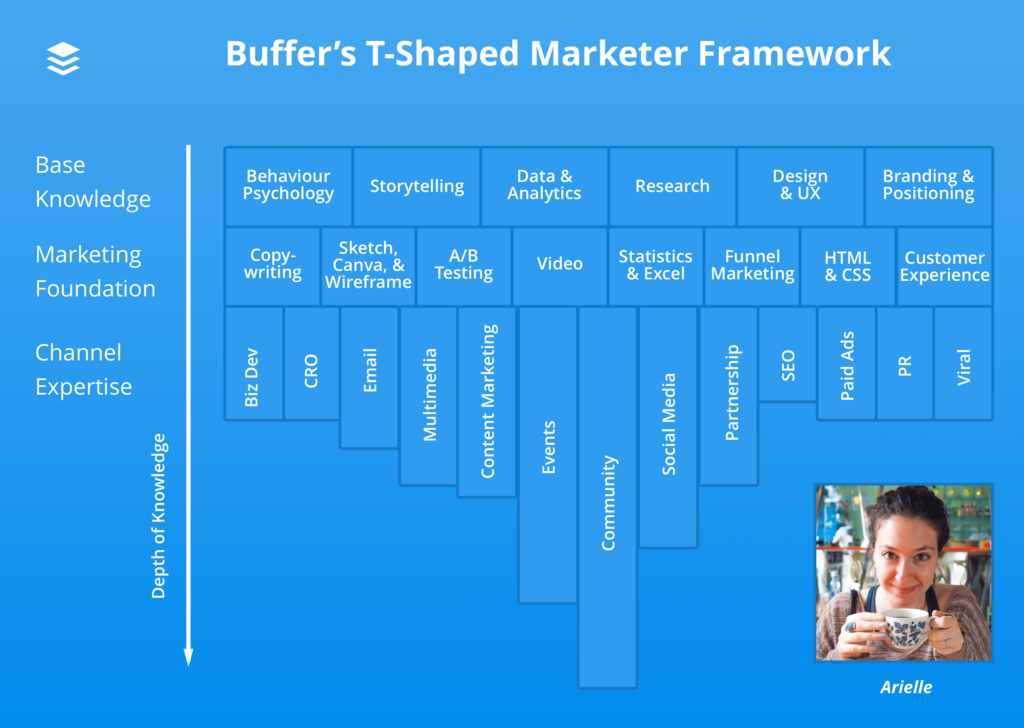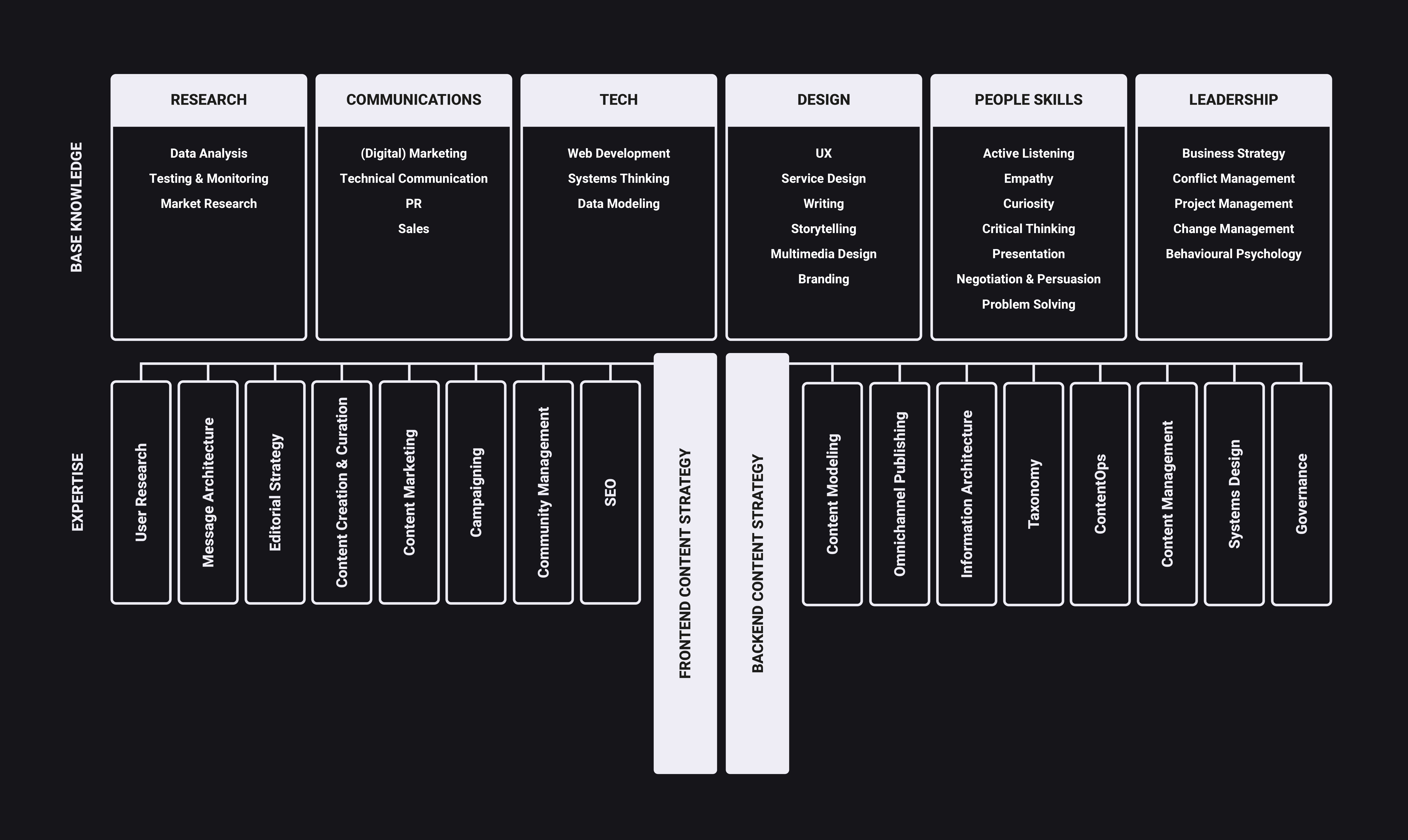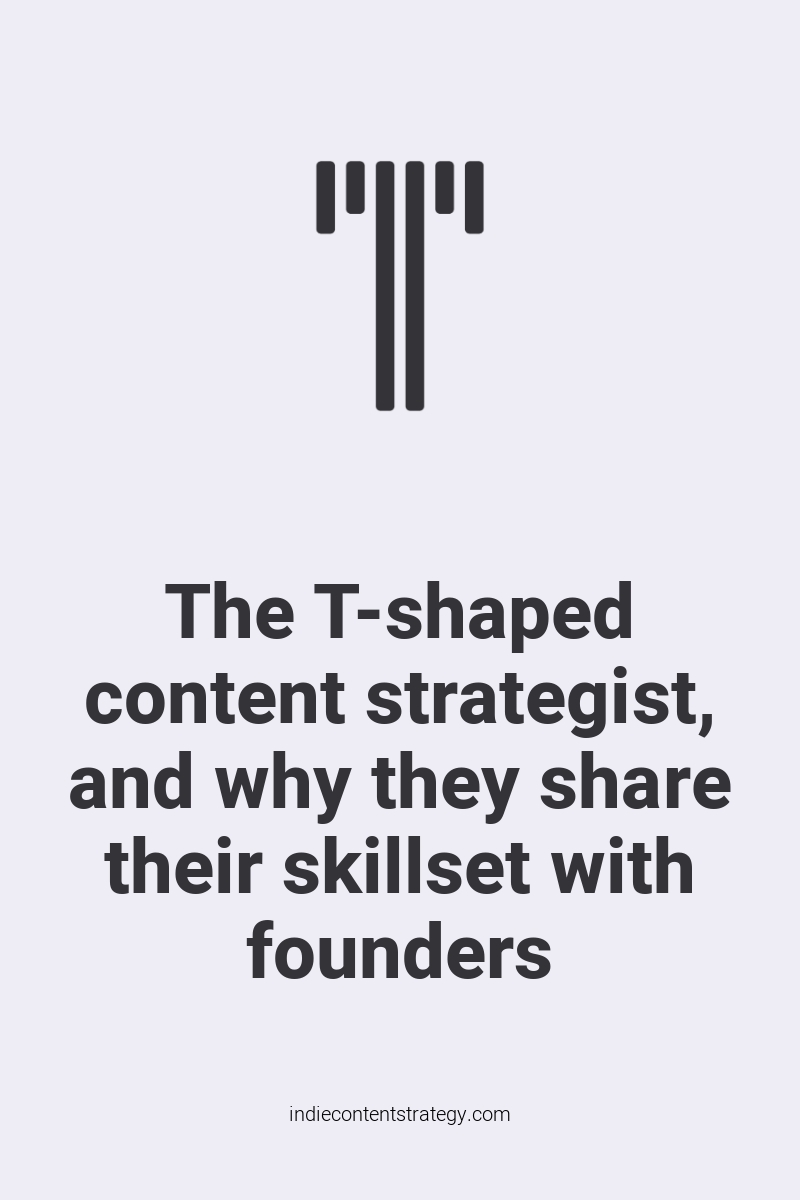My fellow students and I continuously discuss what skills are important for a content strategist. It’s kind of ridiculous how hard it is to really get a grasp on that.
We all come from wildly different backgrounds. Journalists (like Verena), brand managers (like Sandra), content marketers (like Dominik), designers (like Emanuel),.. Everyone of us brings their own perspective, everyone has a different focus. All of them are valid and valuable. The same is true about our lecturers, respected members of the content strategy community themselves.
How to express all the differences and similarities within just one job title?
Recently, we discussed the profile of a T-shaped marketer – a skills profile used f.ex. at Buffer, and how it partly describes skills of a content strategist as well. You can use it to illustrate a marketer’s unique expertise:

While the framework doesn’t exactly fit our skillsets as content strategists, we were intrigued by the concept of a T-shaped skillset. It felt nice to have something to hold on to while discussing, and it seemed to be a model that could capture our diversity and focus.
What is a T-shaped skillset?
The T-shaped skills profile is a concept from recruitment. It helps create teams in which people’s skills complement each other.
T-shaped people are also called expert-generalists: They have a broad understanding of all disciplines within a domain, and a deep understanding of some specific skills.
People with a T-shaped skills profile are able to understand experts from other specialties. They are comfortable tackling things outside of their scope, and are generally – my hypothesis – more open-minded and not afraid to learn. Basically, these people know how their work relates to the whole picture.
This describes all content strategists I’ve met so far (and most bootstrapped founders and indie makers as well!)
I think this model definitely has value to describe the skillsets of those practicing content strategy. Back in 2014, Margot Bloomstein already published her thoughts about being a T-shaped content strategist on her blog, and it has resonated with the community.
The T-shaped Content Strategist
In my attempt to take a closer look, I came up with a draft of a framework for a T-shaped content strategist.

A T with wide branches
The branches of the T are the areas where content strategists have or need general knowledge in. To look at things holistically, we need insights into as many of them as possible. I specifically included soft skills as well as hard skills. Personally, I don’t make any distinction in importance and I feel they are a defining factor of our field.
The stem of the T consists of the different areas of expertise of content strategists, divided into frontend- and backend content strategy, (loosely) based on Ann Rockley’s distinction of the two types of content strategists.
Just as not every designer specializes in handlettering or illustration, not every content strategist focuses on making content operations more efficient. With this framework, every content strategist could illustrate their own skill set flexibly, showing their focus.
Usually, content strategists evolve from the base knowledge disciplines. Many people stumbling into this field already have a lot of experience within (one of) the base knowledge pillars, and use those to naturally carve their own unique specialization.
Founders & Content Strategists
What do content strategists and indie makers have in common? What skills are essential for both? I’ve been exploring these tangents for over a year now while studying content strategy. The more I look, the more similarities I find.
Looking at the T-shaped content strategist, this gets even clearer for me. Their base knowledge is almost the same as what I consider to be essential for any founder of a digital business, save for some skills that are more important for a consultant role.
It’s not that surprising if you think about it: Content is connected to everything and everyone in a business, important for every step you take. It’s best handled with the same kind of critical thinking and problem-solving skills a founder needs to create their business from nothing.
But – even more interesting – bootstrappers develop many content strategy skills while building their own products. They’ll just do content modeling out of necessity. Most won’t know what it is they are doing, and where to find advice about doing it right. Therefore they only get better through trial and error.
I would award the title of a content strategist to many bootstrapped founders without hesitation. But I also see a lot of potential to educate aspiring makers about these important skills and turning them into known unknowns.
So, as always: Towards more content strategy awareness!
Sources & Reading suggestions
- Growing the T-Shaped Content Strategist by Margot Bloomstein
- How to become a T-Shaped Marketer by Buffer
- Why You Need Two Types of Content Strategist by Ann Rockley
- The Four Stages of Competence



